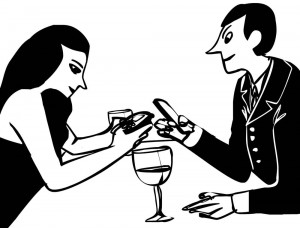Social devices can be used to foster connectivity
Last Friday, I stepped out from behind my screen long enough to enjoy an ancient form of entertainment: a play.
Fittingly, the play was called Dead Man’s Cell Phone.
The theatre department’s production tells the story of a woman who encounters a dead man at a cafe. Unable to forget the event, she takes his cell phone, answers the calls and weaves her way into his surreal life.
The play is wonderfully complex, and I won’t pretend to know how to distill its message in a few sentences. One thing struck me, though — its strong emphasis on communication technology’s ability to isolate people.
Throughout the play, the main character describes strangers jabbering away on cell phones, totally unaware of the life going on around them. The idea is bleak, but it’s not unheard of. The media — professional and otherwise — constantly produce commentary about the ways technology cripples our ability to deal with real human contact, but that might not be the case. We should not view technology as something that governs our lives.
In all, there’s a whole lot wrong with this portrait.
On the other end of the spectrum, companies like Facebook and Google proclaim technology turns society into a hub of positive human interaction. In 2010, Facebook founder Mark Zuckerberg said his team is “building a web where the default is social.”
There’s a whole lot wrong with this portrait, too.
Why does the dichotomy need to exist? It’s a simplistic product of hasty conclusions and marketing. Though all devices are designed for different uses, technology itself doesn’t have inherent values like “good” or “bad;” to follow that line of thinking is to forget who’s in power. The machines don’t use us. We use them.
Instead of seeing communication technology through this divisive lens, we should recognize it for what it is: a set of tools. We can use these tools to meet people or shut people out. Either way, it’s a choice.
The cell phone demonstrates the incongruity of this divide. All around campus, people match the descriptions in Dead Man’s Cell Phone.
Many students walk to class with cell phones glued to their ears, eyes fixed on a random point in the distance.
Yet, in the process of ignoring our surroundings, we’re often using our time to communicate with the people who are most important to us.
Without cell phones, many of us would go for weeks without talking to our friends and family.
It’s funny that some older people use cell phones as proof that our generation is disconnected. According to the Social Issues Research Centre, however, texting functions as “social grooming,” a kind of mobile stop-and-chatting that actually strengthens relationships.
Instead of revolving around categorization, the conversation needs to be about usage. There’s no reason to blame communication technology for destroying our relationships, or to lavish it with praise for making us more social.
We need to ask ourselves how to make the best of what’s already being created. Silicon Valley certainly isn’t going away.
Plenty of other technologies developed outside of Silicon Valley also connect and disconnect. Blogging platforms are no different. Tumblr, for example, is designed to let bloggers take bits and pieces of the Internet and scrapbook them. It’s quite possible to become glued to the computer, collecting these pieces and finding new things to post — just search “Tumblr addiction” on the search engine of your choice.
But Tumblr also generates local meet-ups, introducing bloggers to nearby residents with similar interests. These people would have never found each other if they hadn’t spent some quality time with their screens.
Knowing people use technology for such different purposes, how can anyone describe it as isolating or connective? It’s both.
Maya Itah is a senior majoring in communication. Her column “From Behind the Screen” runs Thursdays.

